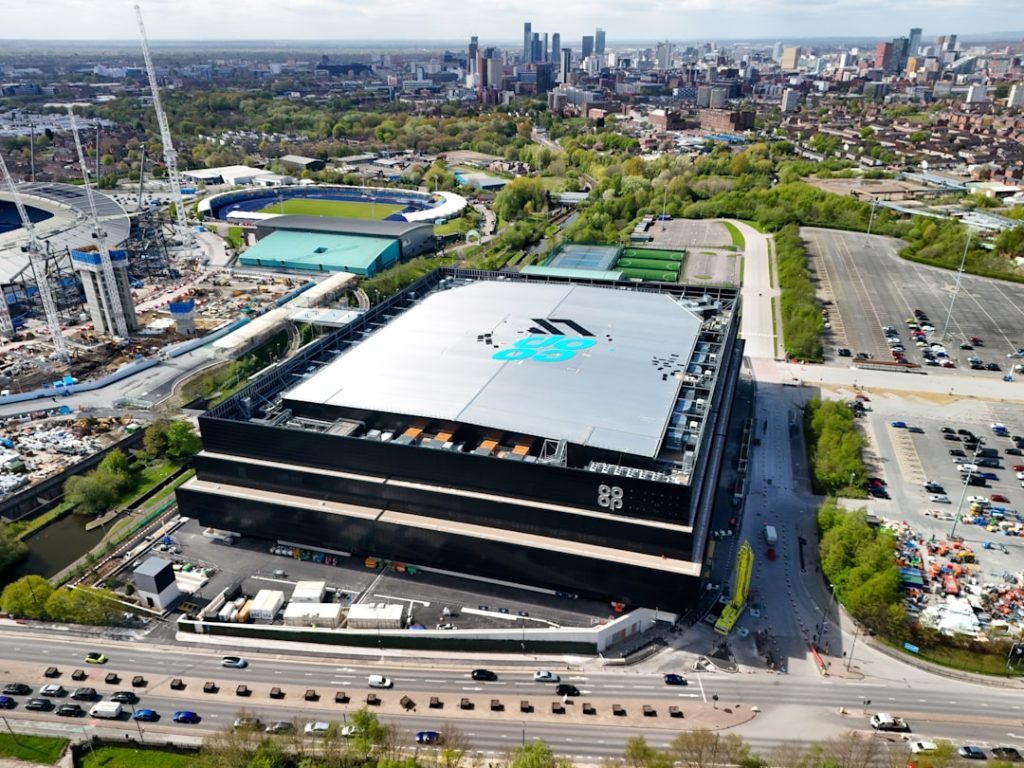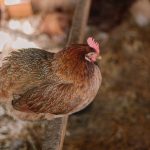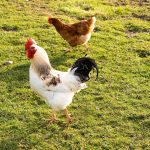Chickens are highly susceptible to heat stress due to their lack of sweat glands and reliance on panting for temperature regulation. High temperatures can quickly lead to overheating in chickens, resulting in various health issues. Heat stress can cause decreased egg production, poor egg quality, reduced feed intake, and in severe cases, death.
It also weakens the chickens’ immune systems, making them more vulnerable to diseases and infections. Chicken owners must understand the impact of heat on their flock to implement proactive measures for preventing heat stress and maintaining the health and comfort of their birds. Heat stress in chickens manifests through various signs, including panting, lethargy, reduced activity, and decreased egg production.
Affected chickens may seek cooler areas in the coop or yard, such as shaded spots or areas with a breeze. It is essential for chicken owners to recognize these signs of heat stress in their flock to take appropriate action and mitigate the effects of high temperatures. By understanding how heat affects chickens, owners can implement strategies to provide shade, cool water, and other cooling methods to help their flock cope with hot weather and prevent heat-related health issues.
Table of Contents
- 1 Providing shade and shelter for chickens
- 2 Ensuring access to cool, fresh water
- 3 Creating a cooling dust bath for chickens
- 4 Adjusting feeding schedules for hot weather
- 5 Monitoring and managing heat stress in chickens
- 5.1 Monitoring for signs of heat stress in chickens is crucial for managing their well-being during hot weather. Chicken owners should regularly observe their flock for symptoms such as panting, lethargy, reduced activity, or decreased egg production.
- 5.2 Proactive Measures to Manage Heat Stress
- 5.3 Ensuring the Well-being of Your Flock
- 6 Implementing additional cooling methods for extreme heat conditions
- 7 FAQs
Key Takeaways
- Heat stress can significantly impact the health and productivity of chickens, leading to decreased egg production and increased mortality rates.
- Providing adequate shade and shelter is crucial for chickens to escape the direct heat of the sun and prevent heat stress.
- Access to cool, fresh water is essential for chickens to stay hydrated and regulate their body temperature during hot weather.
- Creating a cooling dust bath with materials like diatomaceous earth can help chickens lower their body temperature and reduce heat stress.
- Adjusting feeding schedules to cooler times of the day can help prevent chickens from overheating while digesting food.
Providing shade and shelter for chickens
Creating Shade in the Yard and Coop
One of the most effective ways to help chickens cope with high temperatures is by providing ample shade and shelter in their coop and outdoor areas. Shade can help reduce the direct impact of the sun’s rays and lower the ambient temperature, providing chickens with a cooler environment to rest and seek relief from the heat. Chicken owners can create shade in the yard by using tarps, umbrellas, or natural structures such as trees or shrubs.
Ensuring Proper Ventilation in the Coop
In the coop, it’s important to ensure that there is adequate ventilation to allow for air circulation and prevent the buildup of heat. Installing fans or vents can help improve airflow and reduce the temperature inside the coop.
Providing Shelter from the Heat
In addition to providing shade, it’s important to offer shelter for chickens to retreat to during the hottest parts of the day. This can include providing access to covered areas in the yard or adding additional shade structures within the coop. By creating a comfortable and cool environment for chickens to escape the heat, owners can help reduce the risk of heat stress and its associated health issues.
The Importance of Shade and Shelter in Hot Weather
Providing shade and shelter for chickens is a crucial part of managing their well-being during hot weather and can make a significant difference in their ability to cope with high temperatures.
Ensuring access to cool, fresh water

Access to cool, fresh water is essential for chickens to stay hydrated and regulate their body temperature during hot weather. When temperatures rise, chickens will drink more water to help cool themselves down through panting and maintaining proper hydration levels. It’s important for chicken owners to ensure that their flock has access to clean, cool water at all times, especially during periods of extreme heat.
This may involve checking waterers frequently to ensure they are functioning properly and refilling them with fresh water as needed. In addition to providing an adequate supply of water, chicken owners can take steps to keep the water cool by placing waterers in shaded areas or using insulated containers to prevent the water from heating up too quickly. Adding ice packs or frozen water bottles to the waterers can also help lower the temperature of the water and provide chickens with a refreshing drink.
By ensuring access to cool, fresh water, chicken owners can help their flock stay hydrated and reduce the risk of heat stress during hot weather.
Creating a cooling dust bath for chickens
Dust bathing is a natural behavior for chickens that helps them maintain healthy feathers and skin. During hot weather, creating a cooling dust bath for chickens can provide them with a way to regulate their body temperature and stay comfortable. A cooling dust bath can be made by mixing fine sand or dust with diatomaceous earth and placing it in a shaded area of the yard or coop.
Diatomaceous earth has natural cooling properties and can help chickens stay cool while they engage in their dust bathing behavior. In addition to providing a cooling dust bath, chicken owners can also add herbs such as mint or lavender to the dust mix, which have natural cooling properties and can further help chickens cope with high temperatures. Allowing chickens access to a cooling dust bath gives them a way to self-regulate their body temperature and provides them with a natural way to stay cool during hot weather.
By creating a cooling dust bath for chickens, owners can help their flock manage the effects of heat stress and maintain their overall well-being.
Adjusting feeding schedules for hot weather
During periods of extreme heat, it’s important for chicken owners to adjust their feeding schedules to help their flock cope with high temperatures. Chickens may have reduced appetites during hot weather, so it’s important to monitor their feed intake and adjust feeding times accordingly. Feeding chickens during the cooler parts of the day, such as early morning or late evening, can help encourage them to eat when they are more likely to have an appetite.
In addition to adjusting feeding times, chicken owners can also consider offering smaller, more frequent meals during hot weather to prevent feed spoilage and reduce the risk of attracting pests. Providing access to fresh fruits and vegetables with high water content, such as watermelon or cucumbers, can also help keep chickens hydrated and provide them with essential nutrients during periods of extreme heat. By adjusting feeding schedules and offering appropriate foods, chicken owners can help their flock maintain proper nutrition and reduce the risk of heat-related health issues.
Monitoring and managing heat stress in chickens

Monitoring for signs of heat stress in chickens is crucial for managing their well-being during hot weather. Chicken owners should regularly observe their flock for symptoms such as panting, lethargy, reduced activity, or decreased egg production.
Recognizing the Signs of Heat Stress
If signs of heat stress are present, it’s important to take immediate action to help chickens cool down and prevent further health issues.
Proactive Measures to Manage Heat Stress
In addition to monitoring for signs of heat stress, chicken owners can take proactive measures to manage heat stress in their flock by providing cooling methods such as shade, shelter, cool water, and dust baths. Implementing these strategies can help reduce the impact of high temperatures on chickens and minimize the risk of heat-related health issues.
Ensuring the Well-being of Your Flock
By monitoring and managing heat stress in chickens, owners can help ensure the well-being of their flock during hot weather.
Implementing additional cooling methods for extreme heat conditions
In extreme heat conditions, additional cooling methods may be necessary to help chickens cope with high temperatures and prevent heat stress. One effective method is using misters or sprinklers in the yard or coop to create a fine spray of water that can help lower the ambient temperature and provide chickens with a way to cool down. It’s important to ensure that misters or sprinklers are set up in shaded areas and that chickens have the option to move away from the spray if they prefer.
Another cooling method for extreme heat conditions is providing frozen treats for chickens, such as frozen berries or yogurt, which can help keep them cool and hydrated during hot weather. Offering frozen treats in addition to regular feed can provide chickens with essential nutrients while helping them stay comfortable in high temperatures. Additionally, using evaporative cooling pads or portable air conditioning units in the coop can help lower the temperature and provide chickens with a cooler environment during extreme heat conditions.
In conclusion, understanding the impact of heat on chickens is essential for ensuring their well-being during hot weather. By providing shade and shelter, ensuring access to cool, fresh water, creating a cooling dust bath, adjusting feeding schedules, monitoring and managing heat stress, and implementing additional cooling methods for extreme heat conditions, chicken owners can help their flock cope with high temperatures and reduce the risk of heat-related health issues. Taking proactive measures to mitigate the effects of heat stress is crucial for maintaining the health and comfort of chickens during hot weather.
If you’re looking for ways to keep your chickens cool in hot weather, you may want to check out this article on heater options for a chicken coop. It’s important to ensure that your chickens have a comfortable environment, especially during the summer months. This article provides valuable information on how to regulate the temperature inside the coop to keep your chickens healthy and happy.
FAQs
How can I keep my chickens cool in hot weather?
To keep chickens cool in hot weather, provide plenty of shade, ensure good ventilation in the coop, and offer cool water for drinking. You can also use misters or fans to help lower the temperature.
What are some signs that my chickens are overheated?
Signs that your chickens may be overheated include panting, holding their wings away from their bodies, and decreased egg production. It’s important to take action to cool them down if you notice these signs.
What should I do if my chickens are overheated?
If your chickens are overheated, move them to a cooler area with shade and provide them with cool water to drink. You can also use a fan or misters to help lower the temperature. If the situation is severe, consider contacting a veterinarian for advice.
Are there specific breeds of chickens that are better suited for hot weather?
Some chicken breeds are more heat-tolerant than others. Breeds such as Leghorns, Rhode Island Reds, and Sussex are known for their ability to handle hot weather better than breeds with heavier feathers or smaller combs.
Should I adjust my chickens’ diet in hot weather?
In hot weather, it’s important to ensure that your chickens have access to fresh, cool water at all times. You can also offer water-rich fruits and vegetables, and consider adjusting their feed to include more electrolytes to help them stay hydrated.

Meet Walter, the feathered-friend fanatic of Florida! Nestled in the sunshine state, Walter struts through life with his feathered companions, clucking his way to happiness. With a coop that’s fancier than a five-star hotel, he’s the Don Juan of the chicken world. When he’s not teaching his hens to do the cha-cha, you’ll find him in a heated debate with his prized rooster, Sir Clucks-a-Lot. Walter’s poultry passion is no yolk; he’s the sunny-side-up guy you never knew you needed in your flock of friends!
Meet Walter, the feathered-friend fanatic of Florida! Nestled in the sunshine state, Walter struts through life with his feathered companions, clucking his way to happiness. With a coop that’s fancier than a five-star hotel, he’s the Don Juan of the chicken world. When he’s not teaching his hens to do the cha-cha, you’ll find him in a heated debate with his prized rooster, Sir Clucks-a-Lot. Walter’s poultry passion is no yolk; he’s the sunny-side-up guy you never knew you needed in your flock of friends!







